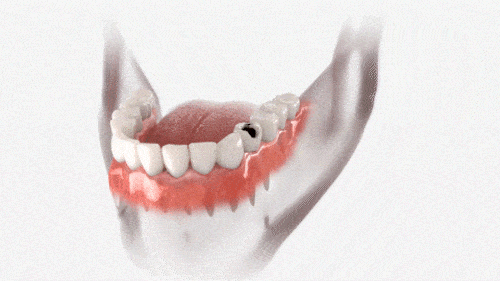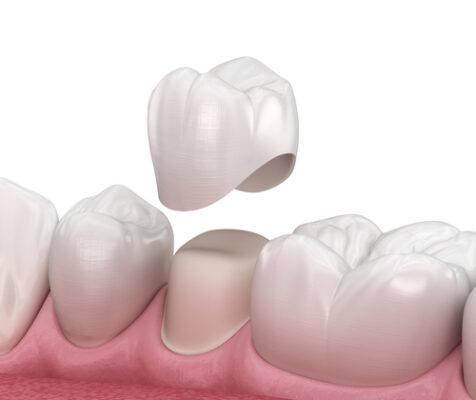Dental Crowns in Melbourne, FL
20% of adolescents (ages 16-19) and 26% of adults have untreated tooth decay. When decay progresses and a filling is no longer a viable treatment option, you may need a dental crown. Dental crowns are a common and versatile treatment that restores function to teeth that are decayed, cracked, weak, or worn down. If you have a damaged tooth and need a crown, we can help.
What Are Dental Crowns?
Dental crowns, sometimes called “caps,” provide a protective barrier that restores function to damaged teeth. While a dental filling covers a cavity, a crown encompasses the entire visible surface of your tooth. Crowns protect and strengthen your damaged natural teeth to prolong their life.
There are many materials used in dental crowns to suit each individual’s unique needs and preferences. Metal, ceramic, porcelain, and resin are commonly used in crowns. Which material is best for you will depend on the location of the affected tooth and the severity of the damage. While some materials are best for long-term durability, others are preferred for their natural look. Each type of crown has advantages and drawbacks that we will happily discuss with you at your free consultation.
Who Needs a Dental Crown?
You may need a dental crown if you experience tooth sensitivity (especially to hot or cold foods and drinks) or the sudden onset of tooth pain. We may also recommend a crown for those needing a large filling or root canal therapy. In these instances, the crown strengthens the tooth and maintains its structural integrity.
Dental crowns are often used in the following circumstances:
- Your tooth is weakened from decay.
- Your tooth is cracked or broken above the gumline.
- Your tooth is at risk of fracturing.
- Your tooth is worn down, often from grinding or clenching.
- You need to strengthen support teeth for a dental bridge.
- You’ve had a root canal or large filling.
For those who have a missing tooth or need an extraction for a severely damaged tooth, prosthetic crowns are used on top of dental implants.
While dental crowns are primarily restorative, they can be used for cosmetic purposes like camouflaging stained, discolored, or misshapen teeth. For aesthetic concerns, dental veneers may be more suitable for achieving a beautiful smile.
The Importance of Dental Crowns
When weak, cracked, or decayed teeth are left untreated, more serious problems arise. Decay can lead to larger cavities that allow bacteria to infect the tooth’s pulp, requiring root canal therapy to treat. Untreated decay can also cause a painful infection called an abscess. When a tooth is severely damaged from decay, it may fall out on its own, or we may need to extract it to prevent the spread of infection.
A cracked tooth is unlike a broken bone: it will not heal itself. If a crown is not placed on a worn, weak, or cracked tooth, the weakened tooth can fracture, and the cracked tooth can advance deeper. A cracked tooth that extends beyond the gum line cannot be treated and must be removed.
While cracked, worn down, and decayed teeth can be successfully restored, early detection and treatment are imperative. Our main priority is to salvage your natural tooth as soon as possible to avoid complications. The sooner the affected tooth is treated, the better the outcome.
However, if your tooth falls out or needs to be extracted, we can use mini dental implants to fill the gap in your smile. A mini implant is a prosthetic tooth root made of durable titanium. It supports an artificial crown to restore your bite force and chewing function. While missing teeth can profoundly impact your daily habits, mini implants are a convenient and cost-effective treatment. In some cases, Dr. Apel can extract a tooth, place a mini implant, and mount a crown in a single appointment.
The Dental Crown Procedure
At your consultation, we’ll thoroughly examine your teeth and take X-rays to evaluate the degree of damage and determine needed procedures. If a dental crown is a good solution, we’ll discuss materials, costs, and procedure details. We will then design a treatment plan that aligns with your needs, goals, and budget.
The dental crown procedure takes two stages: preparation and placement. Both appointments take approximately one to two hours.
Preparing the Tooth
To prepare your tooth, we need to reshape it so that the crown fits perfectly over the top. To do this, we’ll first apply a local anesthetic to your gums to make sure you are comfortable during the procedure. Then, we will remove some of the tooth’s enamel or add material to a worn-down tooth. Shaping the tooth properly ensures the crown fits correctly. An improperly fitting crown can lead to a misaligned bite.
Once the tooth is properly shaped, we will take impressions. These imprints allow the dental lab technicians to create your custom crown. Fabricating the crown typically takes between two and three weeks. Until then, we will place a temporary crown to protect the area.
Placing the Crown
When you return to the office, we will remove the temporary crown and place your new custom crown. Dr. Apel will check the shape and fit of the crown before cementing it permanently to the tooth.
Your new restoration will allow you to chew normally, restoring function to your affected tooth and preventing further damage. You can return to work or school immediately after we place the crown, though it is normal to experience some sensitivity or tenderness in the days following placement. Over-the-counter pain medications like ibuprofen can alleviate any lingering discomfort.
Caring for Dental Crowns
Depending on the materials used and proper care measures taken, the average lifespan of a dental crown is 5-15 years, although some last up to 30 years.
Maintaining proper oral hygiene includes:
- Brushing twice daily with fluoride toothpaste and a soft-bristle brush
- Flossing daily
- Wearing a mouthguard when playing sports
- Using a nightguard to protect your teeth from grinding or clenching during sleep
- Visiting us at Designing Smiles Dentistry for regular checkups every six months
Additionally, avoiding certain foods will prolong the life of your crown. We recommend avoiding foods that can break or chip your crown, such as hard or crunchy foods like pretzels, seeds, popcorn, and nuts. Be cautious when eating raw vegetables, or try to cook vegetables to soften them. You should also avoid chewy foods that can loosen or dislodge your crown, like caramel and sticky candy.
Certain habits can also damage your crown, such as chewing on ice, biting pens, and using your teeth as tools.
The Cost of Dental Crowns
The cost of dental crowns varies depending on the material chosen. When used as a restorative procedure, insurance companies typically cover part of the cost of crowns, but the amount covered is unique to your plan. If you’re unsure about your plan details, we will help you understand your benefits and any out-of-pocket costs before your procedure.
For those needing to finance their dental work, we partner with multiple third-party lenders—including CareCredit, Sunbit, Proceed Finance, and Cherry—to leverage the best rates for our patients. With introductory rates as low as 0% and flexible monthly payment plans, affording your treatment has never been easier.
Protect Vulnerable Teeth with Dental Crowns
If you have a cracked, worn down, or severely decayed tooth, don’t wait to treat it. Capping the tooth with a dental crown creates a protective barrier that extends the life of your natural tooth and prevents complications. A crown provides the needed structural support to restore function to the tooth, promote your oral health, and enhance your overall well-being.
If you think you might need a dental crown, contact Designing Smiles Dentistry today for a free consultation. With over 30 years of experience, you can trust Dr. Apel and his compassionate team to provide expert dentistry that restores your bite and your smile.
